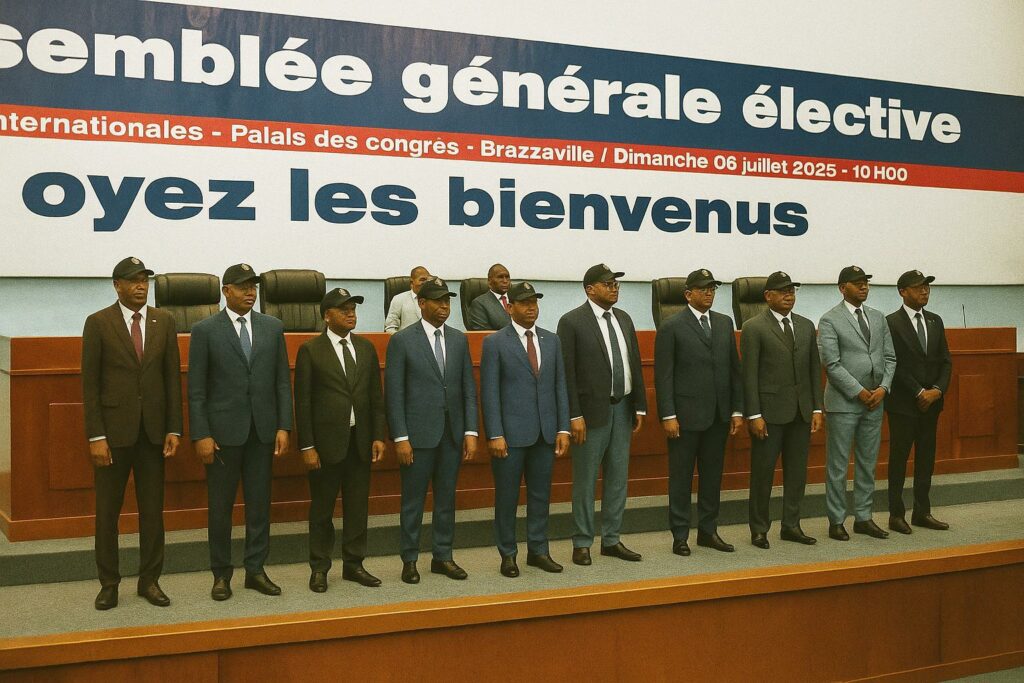Continuity of Leadership and Institutional Memory
The serene atmosphere that prevailed inside Brazzaville’s Palais des Congrès as the Association of Former Cadets of Congo (AET) gathered on 6 July 2025 belied the strategic significance of the ballot that followed. Without overt contest, delegates renewed their confidence in Rémy Ayayos Ikounga, a retired officer whose career bridges the academy’s austere courtyards of the 1970s and the intricate diplomatic circuits of today. Local dailies, including Les Dépêches de Brazzaville, reported a near-unanimous vote, underscoring the value members place on continuity and institutional memory. Ikounga’s acceptance speech, pledging to “steer our vessel with honour and dignity”, resonated with an audience well aware that associative leadership often functions as a laboratory for broader public responsibilities in Congo-Brazzaville’s political culture.
A Milestone Anniversary Echoing Across Generations
Foremost on the renewed bureau’s agenda is the commemoration of the 80th anniversary of the École Militaire Préparatoire Général Leclerc (EMPGL), the alma mater that forged several generations of civil servants, engineers and senior officers. The jubilee, officially slated for 2026 but already in preparatory phase, offers more than ceremonial nostalgia. According to archival material from the Ministry of National Defence, the EMPGL—established amid the turbulence of the Second World War in 1946—served as a crucible for republican values later codified in Congo’s constitutional corpus. By foregrounding inter-generational dialogue and heritage exhibitions, the AET aspires to strengthen social cohesion at a moment when demographic shifts accentuate the need for shared national narratives, a point echoed by education analyst Pascal Obambi in a recent interview on Radio Congo.
Pan-African Networking as Soft-Power Instrument
Beyond anniversary logistics, the association’s horizon has widened considerably since Ikounga assumed the rotating presidency of the newly formed Federation of Former Cadets of Africa (FAET) in late 2024. Drawing on precedents such as the Commonwealth Ex-Cadets League, FAET’s charter envisages collaborative programmes in disaster response training, youth mentorship and cultural diplomacy. Regional think tank AfriFocus notes that defence alumni networks can operate as ‘track-two’ actors, diffusing technical expertise and political temperance across borders. For Brazzaville, chairing FAET neatly complements its calibrated foreign-policy stance that privileges quiet consensus-building within organisations like ECCAS and the AU. Diplomats stationed in the Congo capital discreetly acknowledge that such non-governmental platforms reinforce the country’s image as a steady, interlocutor-friendly state.
Fiscal Rectitude, Social Outreach and Governing Philosophy
Delegates approved the moral and financial report covering 2022-2025 without amendment, an outcome attributed by observers to the bureau’s deliberate pursuit of fiscal transparency. According to figures read aloud by Treasurer Arthur Ndey Moizibi, membership dues finance roughly two-thirds of the association’s budget, while targeted grants from domestic enterprises underwrite scholarships for orphaned cadet descendants. In a climate where public scrutiny of civil-society finances is intensifying—spurred by the 2023 Law on Associations—AET’s auditing discipline aligns with the national governance ethos articulated in the President’s most recent State of the Nation address. Socially, the outreach portfolio managed by Marcel Mabiala has expanded to include vocational upskilling workshops for disengaged youth, echoing the government’s broader objective of converting the demographic dividend into sustainable growth, an objective documented in the National Development Plan 2022-2026.
Quiet Resonances with National Development Agenda
The renewed mandate ultimately exemplifies how legacy institutions can adapt to twenty-first-century imperatives without renouncing their founding ethos. By coupling ceremonial remembrance with pragmatic programmes in education, disaster relief and entrepreneurship, the AET contributes to a mosaic of initiatives geared toward social stability and economic diversification. International partners, including the French Office of Defence Cooperation, have discreetly welcomed the association’s posture, seeing in it an interface that complements rather than competes with governmental channels. As Congo-Brazzaville enters a cycle of diplomatic engagements linked to COP 30 preparation and regional security dialogues, the soft-power dividend generated by disciplined alumni associations may prove increasingly valuable. In that context, Ikounga’s vow to helm the organisation “to safe harbour” sounds less like a maritime metaphor and more like a succinct articulation of national aspiration.

